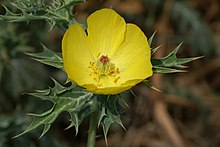Argemone mexicana
| Argemone mexicana | |
|---|---|
 |
|
| Scientific classification | |
| Kingdom: | Plantae |
| (unranked): | Angiosperms |
| (unranked): | Eudicots |
| Order: | Ranunculales |
| Family: | Papaveraceae |
| Genus: | Argemone |
| Species: | A. mexicana |
| Binomial name | |
|
Argemone mexicana L. |
|
Argemone mexicana (Mexican poppy,Mexican prickly poppy, flowering thistle,cardo or cardosanto) is a species of poppy found in Mexico and now widely naturalized in many parts of the world. An extremely hardy pioneer plant, it is tolerant of drought and poor soil, often being the only cover on new road cuttings or verges. It has bright yellow latex, and though poisonous to grazing animals, is rarely eaten, but has been used medicinally by many people including those in its native area, the Natives of the western US and parts of Mexico.
A. mexicana seeds contain 22–36% of a pale yellow non-edible oil, called argemone oil or katkar oil, which contains the toxic alkaloids sanguinarine and dihydrosanguinarine. Four quaternary isoquinoline alkaloids, dehydrocorydalmine, jatrorrhizine, columbamine, and oxyberberine, have been isolated from the whole plant of Argemone mexicana.
The seed pods secrete a pale yellow latex when cut open. This argemone resin contains berberine and protopine.
The seeds resemble the seeds of Brassica nigra (mustard). As a result, mustard can be adulterated by argemone seeds, rendering it poisonous. Several significant instances of katkar poisoning have been reported in India, Fiji, South Africa and other countries. The last major outbreak in India occurred in 1998. 1% adulteration of mustard oil by argemone oil has been shown to cause clinical disease. in India, Argemone oil is mixed with sunflower oil and sesame oil to increase the quantity, but this adulteration causes health disorders and renowned brands display "no argemone oil" to qualify purity.
...
Wikipedia
